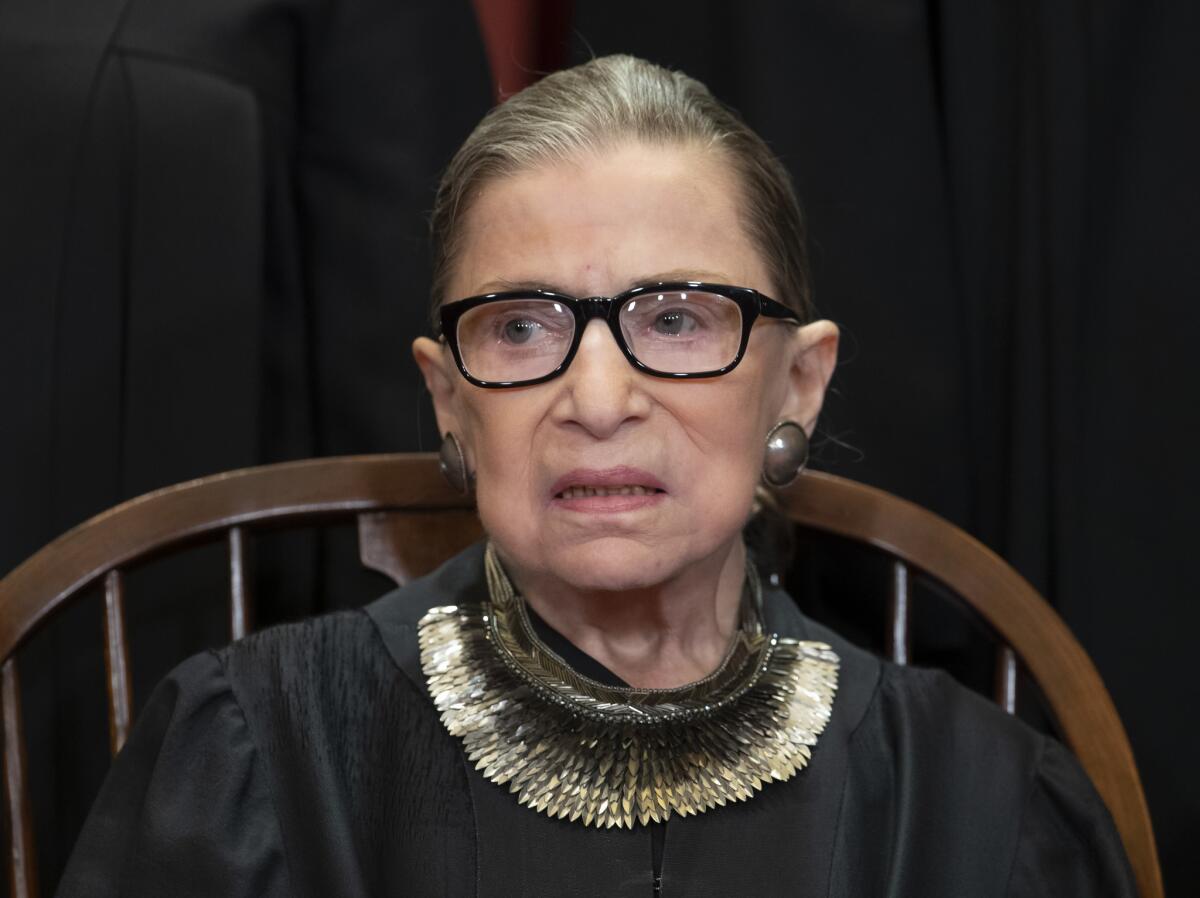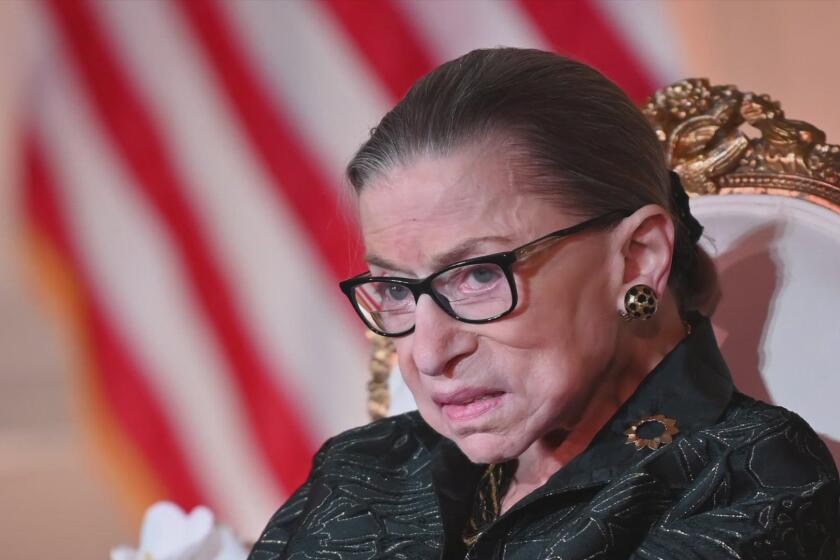Column: What would Mitch McConnell do if Ginsburg’s seat became vacant? You know perfectly well

- Share via
Ruth Bader Ginsburg has been a heroic, brilliant fighter on the liberal wing of the Supreme Court for 27 years, and I’m hoping she keeps doing what she does for years to come.
But Ginsburg is 87 years old, and on Friday she announced that she is undergoing chemotherapy for a recurrence of cancer, this time on her liver. She has previously had surgery for lung cancer, radiation treatment and surgery for pancreatic cancer and treatment for colon cancer, and she’s bounced back before, so let’s not count her out.
But we also can’t ignore the question of Ginsburg’s mortality for the simple and obvious reason that if her seat were to become vacant between now and the November election, it would fall to President Trump to nominate her successor. Were that person to be confirmed by the Senate, he or she would be Trump’s third appointment to the nine-member court.
Justice Ruth Bader Ginsburg was the second woman to serve on the Supreme Court and the first to become a pop culture icon.
That would be a disaster. But it would be more than just a disaster. It would also be a blatant and infuriating act of hypocrisy on the part of Senate Majority Leader Mitch McConnell (R-Ky.).
Has anyone forgotten the sordid events of 2016, when the cynical, unprincipled McConnell refused to even consider the nomination of President Obama’s choice for the Supreme Court, Merrick Garland?
Justice Antonin Scalia had died, and it was Obama’s constitutional duty and prerogative to fill the seat during the nearly a year he still had in office. But McConnell simply refused to hold confirmation hearings in the Senate, running out the clock until the following January, when he hoped a Republican would be inaugurated as president.
McConnell’s thinner-than-thin argument for such a transparently partisan maneuver was that a president in the fourth year of his term shouldn’t be appointing new justices. Instead, he argued, the nomination should be tabled until after the election.
“The American people should have a voice in the selection of their next Supreme Court justice,” McConnell said the day Scalia died in February 2016. “Therefore, this vacancy should not be filled until we have a new president.”
It worked. McConnell stonewalled for more than 11 months. The Republicans successfully stole the appointment.
So, back to Ginsburg. If she were to die or resign in the coming months — the final months of Trump’s four-year term — the only honorable, morally consistent thing for McConnell to do would be to take a step back, refuse to consider a Trump nominee and put the issue off until after Inauguration Day, so that the American people can have their say.
But surprise, surprise — McConnell has no intention of doing the honorable, morally consistent thing at the expense of another conservative justice. He’s already made it clear several times that he doesn’t feel constrained by the rules he himself set out in 2016.
In an interview in May, for instance, he was asked what he would do if a Supreme Court seat came open in 2020 during the presidential campaign. “Oh, we’d fill it,” he said.
In a rational world, that’d be shocking. In ours, it raised few eyebrows.
Now don’t think McConnell doesn’t have an explanation for why he blocked Obama’s nominee but would nevertheless confirm a Trump nominee. He wouldn’t be a politician if he didn’t have some self-serving double-talk to justify the flip-flop.
The difference, he says, is this: In 2016 the Senate and White House were controlled by different parties. This time both are controlled by Republicans.
He claims now that he held up Garland based on a tradition that opposition parties in control of the Senate do not confirm nominees during presidential election years. But now, the same parties control the Senate and White House, so, well, never mind.
Huh? What? That makes no sense. Where in the Constitution is that spelled out? Either the president deserves a hearing for his nominee or he doesn’t.
The bottom line is this: McConnell set the rules in 2016; he’s still in power four years later. He should live by the terms of his own supposed principles. If Ginsburg’s seat becomes vacant, he should not hold confirmation hearings on a Trump appointment.
The mistreatment of Merrick Garland stands as an enormous wrong — to Garland, to Obama and to the country; it was theft, plain and simple. It exacerbated the erosion of bipartisan cooperation and civility.
By sticking with his own precedent, though, McConnell could undo the damage and help put the country back on the road to functional government, rather than leaving a gaping injustice in place in perpetuity.
Then in future years the U.S. could revert to the way things are supposed to work.
If McConnell takes me up on my suggestion, I will eat my house. It’ll never happen.
So instead, I’ll continue to hope, wish and if necessary pray for Justice Ginsburg’s health.
More to Read
A cure for the common opinion
Get thought-provoking perspectives with our weekly newsletter.
You may occasionally receive promotional content from the Los Angeles Times.












